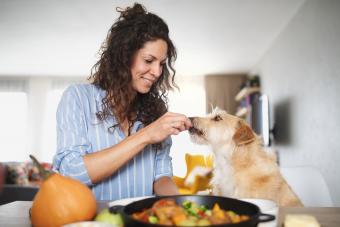
If your dog accidentally ate a pickle, there's likely no need to panic. Pickles are not harmful to dogs in small quantities; but this is not a snack you should intentionally feed your dog. If a dog eats enough pickles, the sodium can have adverse health effects. Common additives in pickles like spices, garlic, and special flavorings can also make your dog sick. It's important to understand how many pickles might be too many, and when it's time to seek veterinary care.

Pickles Are Not an Ideal Treat for Your Dog
If you aren't familiar with how pickles are made, they are cucumbers soaked in brine, which is a mixture of water, vinegar, salt, and sometimes additives like dill, garlic, onion, pepper, herbs, or sugar. Although cucumbers are safe for dogs, it's the other additions, salt in particular, that pose a threat.
Salt poisoning, or hypernatremia, is a condition that can result from a dog ingesting high volumes of sodium. This leads to electrolyte imbalances which can be fatal if not addressed. Typically, dogs are at risk for salt poisoning if they eat things like homemade playdough, rock salt, table salt, or soy sauce, but enough salty pickles could potentially lead to this condition.
Some ingredients used in pickles like garlic or onions are toxic to dogs. Dill, commonly used in many pickle varieties, is not harmful to dogs. However, even seasonings or spices that aren't necessarily unsafe can still upset your dog's stomach, leading to vomiting or diarrhea.
What to Do If Your Dog Ate Pickles
If you discover that your dog ate pickles, there are a few steps you should take to ensure they have a good outcome.
- First, immediately offer your dog water. Your dog will likely intuitively drink to counteract the sodium that they ingested, but you can encourage them to drink if they don't seem interested.
- Next, try to determine what kind and how many pickles your dog ingested. If they ingested a high volume of pickles, pickles with toxic ingredients like onion or garlic, or show any signs of salt toxicity, seek urgent veterinary care.
- It's always a good idea to contact your veterinarian for guidance, as they know your pet's medical history. If you learn that your dog didn't ingest enough pickles to cause sodium imbalances, monitor for gastrointestinal symptoms like vomiting or diarrhea.
- Keep fresh water available for your dog at all times.
High Sodium Levels in Pickles
Sodium is a mineral that all dogs need for proper organ function, but just like humans, excessive salt intake can have negative effects. An average medium-sized dog needs about 100mg of sodium each day, which they get from food and any extra treats. A single pickle slice contains about 86mg of sodium according to the USDA. So, how many pickles are too many?

The toxic volume of salt for dogs is around 1 gram of sodium for every 1 pound of body weight; the lethal level is closer to 2 grams for every pound of body weight. That means a 10-pound dog would need to ingest over 100 pickle slices or close to three jars of pickle spears to reach toxic levels.
Although that might sound extreme, it's important to remember that other foods contain high volumes of sodium, so if your dog got into the picnic basket at a family gathering and ate several pickles in addition to a hot dog, a handful of potato chips, among other salty foods, they could be at risk for salt poisoning. Other factors can also contribute, like existing diseases or conditions.
Symptoms to Monitor for
There's a chance your dog could develop an upset stomach from eating pickles. Be sure to monitor them for diarrhea and vomiting. If you notice these symptoms worsen or they do not resolve, it's important to see your veterinarian.
Salt toxicity is a serious concern with any high sodium intake. The signs of this condition typically present within three hours of salt consumption, and warrant urgent veterinary care.
- Vomiting
- Diarrhea
- Lethargy
- Inappetence
- Disorientation
- Weakness
- Drinking high volumes of water
- Urinating large amounts
- Breathing with effort
- Tremors
- Seizures
- Death
When to Seek Veterinary Care
Even if your dog didn't ingest a toxic amount of salt, they are still at risk for dehydration. Should your dog become lethargic, weak, stop eating, or pant excessively, see your veterinarian. Of course, if your dog shows any of the symptoms of salt toxicity, ingested a high volume of pickles, or ate pickles with garlic or onion, seek urgent care.
Safe Alternatives to Pickles
Fresh cucumbers are a great snack alternative to pickles. They're the same healthy base vegetable without the harmful additives. Additionally, there's a long list of vegetables that are both safe and beneficial for your dog, including carrots, zucchinis, peas, and green beans. Always make sure veggie pieces are small, to ensure they're not a choking hazard for your dog.

But if you're at a barbeque and would like to offer your dog some type of condiment from your hamburger or hot dog, it's important to use caution. Lettuce is safe for dogs, as are tomatoes, but toppings like onions are toxic.
Can Dogs Eat Pickles?
Although pickles have some healthy properties like minerals and fiber, the risks to dogs outweigh the benefits. An occasional pickle won't hurt them, but overall, pickles are not a good choice to offer your dog as a snack. Instead, choose a fresh fruit or vegetable alternative that can provide your pup with health benefits, and you with peace of mind.







